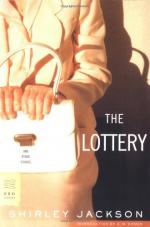|
This section contains 1,599 words (approx. 6 pages at 300 words per page) |

|
SOURCE: “Jackson's ‘The Lottery,’” in The Explicator, Vol. 52, No. 4, Summer, 1994, pp. 242-245.
In the following essay, Yarmove analyzes the meanings of names and dates in “The Lottery,” concluding that the story is designed to challenge the complacency of readers who believe a holocaust could never happen in contemporary America.
The underpinnings of Shirley Jackson's famous post-World War II story “The Lottery” demonstrate that the work is far greater than the sum of its parts. The date of the lottery, its location, and the symbolic or ironic names of its characters all work to convey a meaning that is even more disturbing than the shock created by its well-known ending, namely, that despite assurances during the late 1940s that “it couldn't happen here,” a microcosmal holocaust occurs in this story and, by extension, may happen anyplace in contemporary America. Coming after the revelation of the depths of depravity to...
|
This section contains 1,599 words (approx. 6 pages at 300 words per page) |

|


